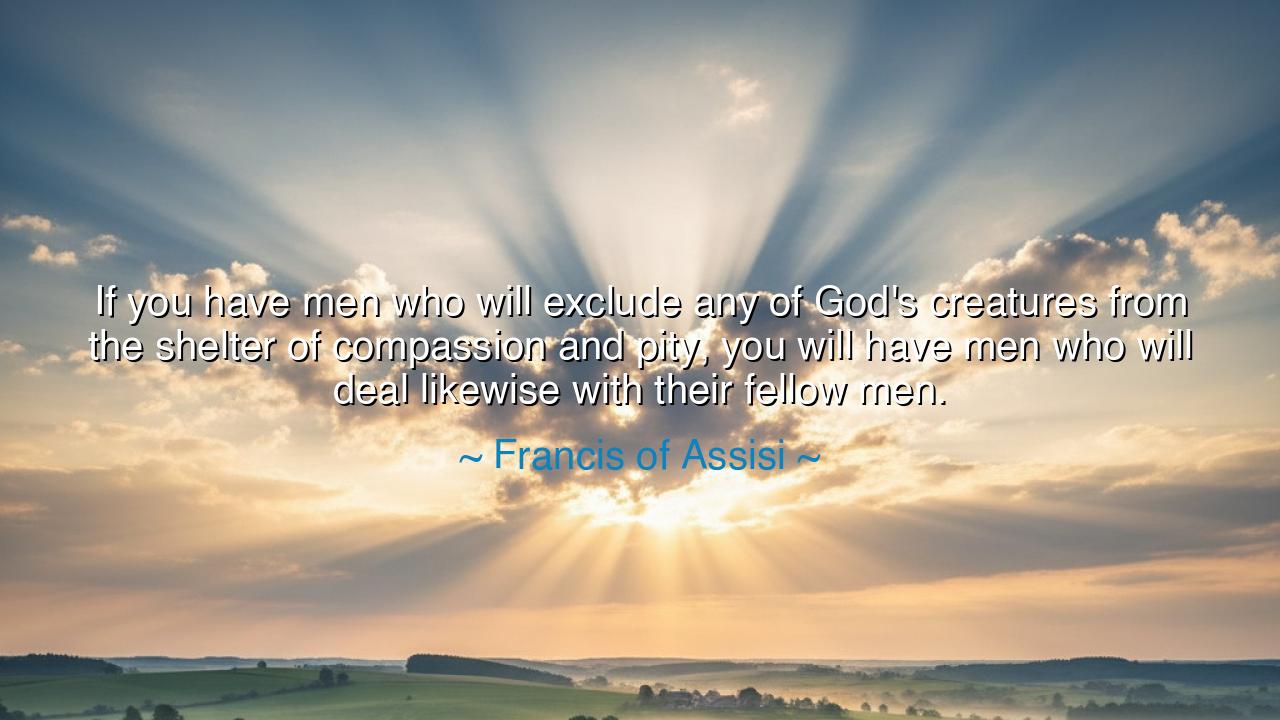
If you have men who will exclude any of God's creatures from the
If you have men who will exclude any of God's creatures from the shelter of compassion and pity, you will have men who will deal likewise with their fellow men.






The words of Saint Francis of Assisi, the humble servant of creation and the messenger of divine compassion, pierce through the centuries with radiant simplicity: “If you have men who will exclude any of God’s creatures from the shelter of compassion and pity, you will have men who will deal likewise with their fellow men.” In this utterance lies the eternal bond between mercy and justice — the truth that how one treats the smallest and weakest of beings reflects how one will treat humankind itself. To Francis, all of creation was kin: the bird, the beggar, the wolf, and the weary soul. He saw that cruelty, once permitted toward any living thing, becomes a contagion that infects the human heart, turning pity to indifference and compassion to coldness.
The origin of this quote rests within the life and ministry of Francis of Assisi, born in Italy in 1181, whose love for both God and creation became the cornerstone of his teaching. Francis rejected wealth and status, embracing poverty so that he might walk in harmony with all that God made. He preached to peasants and nobles, to birds and beasts, teaching that all life is sacred, for each creature is a reflection of divine love. His message was radical in its time — that compassion was not reserved for the human race alone, but extended to every living being, because in each shimmered a spark of the Creator’s light.
At the heart of his teaching lies a universal law of empathy: cruelty does not remain contained. The man who mocks the suffering of an animal will not hesitate to despise the suffering of a stranger. The one who withholds kindness from the helpless will soon justify injustice toward the weak. Compassion, Francis saw, is not divisible — it is a single flame that must be tended, lest it die out entirely. Thus, his words warn that the destruction of mercy toward any creature begins the erosion of morality itself.
History has proven this truth time and again. Consider the transformation of society during times of war or tyranny, when men learned to treat other humans as animals — and soon, they treated animals, the land, and life itself with brutality. The Nazi regime, for instance, cultivated an ideology that ranked beings by worth, first dehumanizing people they deemed inferior, and then extending their disdain toward all life. By contrast, figures like Mahatma Gandhi, who preached ahimsa — nonviolence toward all living things — demonstrated how compassion toward even the smallest creatures nurtures a culture of peace and moral strength. Gandhi himself said, “The greatness of a nation can be judged by the way its animals are treated,” echoing the same eternal wisdom that Francis had lived centuries earlier.
Emotionally, Francis’s words awaken the heart because they strike at the root of indifference. In an age where life is often valued by utility, his reminder is revolutionary: every creature, no matter how humble, carries within it the breath of God. To harm one is to wound the whole. To nurture one is to bless the whole. The tenderness that extends to a sparrow or a stray is the same tenderness that restores humanity itself. For love is not measured by its object, but by its quality — and to love the least is to mirror the divine.
The lesson is clear and resounding: cultivate compassion as a discipline, not a sentiment. Let your heart be wide enough to shelter all beings, for mercy once practiced becomes a habit, and that habit becomes character. Guard against hardness, for it creeps quietly through neglect and pride. Each act of kindness — feeding the hungry, tending to a wounded creature, sparing a life when you could take it — strengthens the bond between your soul and the divine.
Practically, live as Saint Francis taught: walk gently upon the earth, for it is holy ground. Care for the vulnerable, human and nonhuman alike. Speak with gentleness, act with empathy, and see in all forms of life the handiwork of God. Teach your children to revere the living world, that they may inherit not only land and wealth, but also conscience and wonder. In doing so, you not only protect the creatures of the earth, but also preserve the nobility of the human soul.
Thus, the words of Saint Francis of Assisi endure like a bell ringing across time: “If you have men who will exclude any of God’s creatures from the shelter of compassion and pity, you will have men who will deal likewise with their fellow men.” Let them remind you that compassion is the foundation of civilization and the mirror of divinity. To close your heart to one life is to close it to all; but to open it — even to the smallest of God’s creatures — is to step once more into the garden of Eden, where harmony, love, and peace flow from every living thing.






AAdministratorAdministrator
Welcome, honored guests. Please leave a comment, we will respond soon